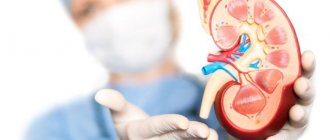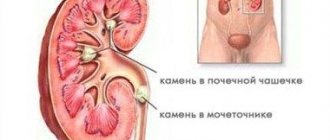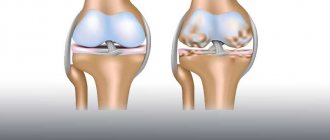Causes of stones in the ureters
The main and most common cause of stones in the ureter is considered to be stones that have descended into this organ from the kidneys. More often it is only one stone stuck in the excretory duct - a very narrow tube up to 30 cm long. But there are cases when there are several stones. For a stone to become stuck, it must be larger than 2mm. Causes of stones in the ureter that have entered it from the kidneys:
- disorders of salt and purine metabolism;
- pyelonephritis;
- urethritis;
- prostatitis;
- cystitis;
- chronic gastrointestinal diseases;
- hereditary predisposition;
- drinking hard drinking water.
If stones descend into the ureter from the kidneys, they are called secondary. Such stones are more common than primary ones, which form in the duct itself due to the following problems:
- ectopia or tumor of the ureter;
- strictures;
- foreign bodies;
- ureterocele.
The causes of stones in the ureter in men are the same as in women. The difference may be prostatitis. This condition occurs only in men and can cause stones. In some cases, the formation of a calculus in the duct is associated with a grain of sand that moved and caught on the mucous membrane of the organ. Salts build up on it and over time a stone forms.
Rehabilitation period
The duration of the rehabilitation period depends on the severity of the removal. During the first time of the recovery period, the patient may experience discomfort or pain, swelling of the soft tissues and an increase in body temperature. These consequences are most characteristic of surgical methods of intervention.
After surgery, it is recommended to follow a gentle regime for the body: do not engage in physical labor, do not suffer from acute respiratory infections or acute respiratory viral infections, and also adhere to the schedule of control ultrasound scans. As a rule, the intervention process itself, as well as the rehabilitation period, is more difficult for men than for women. However, following your doctor's recommendations will help avoid complications.
The content of rehabilitation is not only to restore the functioning of the body, but also to change lifestyle to eliminate the original problem that contributed to the formation of stones. It is important to understand that procedures and operations aimed at removal are aimed at relieving the patient of the symptoms that have arisen. They cannot treat the underlying problem.
Depending on the composition of the stone, the patient is prescribed an individual diet that excludes foods that are harmful for a particular case. Excessive consumption of certain foods from the regular diet contributes to the accumulation of salt substances in the urinary system. In addition, their retention in the body occurs due to insufficient fluid intake during the day. Also, the formation of stones is affected by some functional disorders in the body: gout, hyperthyroidism and others. Therefore, it is necessary to undergo a full examination and therapy to eliminate these diseases. Next, the patient will expect periodic monitoring of the functioning of the urinary system for possible detection of newly formed stones.
It should be remembered that the lack of timely diagnosis and treatment will cost the patient serious health problems in the future. Numerous Moscow clinics provide stone removal services in various ways and at appropriate prices. However, the price may be increased if the patient has to recover after the intervention within the walls of a medical institution.
Symptoms of stones in the ureter
The danger of ureterolithiasis is that stones in the ureters, compared to other locations (in the bladder, urethra, kidneys), cause more severe and serious complications. They are also accompanied by pronounced symptoms. The main symptoms of stones in the ureters:
- Pain in the lower abdomen - when the stone is located in the lower part of the ureter.
- Dull pain covering the entire abdomen - when a stone forms in the upper part of the duct.
- Pain radiating to the pubic area - when a stone forms in a distant part of the ureter, which is located in the bladder.
Additionally, the following may appear:
- elevated temperature;
- general malaise;
- problems with stool;
- increased tone of the abdominal wall;
- increased gas formation.
The stage of self-removal of stones from the ureter is the most difficult, since the duct is very narrow. Only loose formations can pass through it. But even they cause severe pain.
A characteristic symptom if a stone is stuck in the ureter is very sharp pain in the lower abdomen. It is especially strong when the urge to urinate appears. If a headache, chills and weakness appear, this may indicate urinary retention and intoxication of the body. In this case, you should immediately consult a doctor.
The most effective treatments
A specific method for removing stones from the ureter is chosen taking into account several important factors:
- size of stones;
- their quantities;
- location;
- time spent in the ureter;
- general condition of the patient.
If the size is small, they resort to conservative expectant treatment of stones in the ureter. It consists of prescribing antispasmodics, urolitics, antibiotics and a water load of more than 2 liters per day. In such situations, stones can be removed naturally.
In other cases, gentle methods of removing stones from the ureter are practiced, including:
- Lithotripsy – crushing stones using laser or ultrasound: percutaneous contact or remote ureterolithotripsy.
- Crushing stones through the urethra using special solutions.
For stones larger than 1 cm, open or laparoscopic ureterolithotomy is used. This operation is also indicated for severe renal colic, non-advancing stone and blockage of the only kidney.
At the Urology Clinic named after R. M. Fronshtein of the First Moscow State Medical University named after I. M. Sechenov, they resort to minimally invasive methods for treating stones in the ureters. But since they are most effective for stones that are not too large, the patient is required to make an appointment with a urologist as soon as possible. In this case, there is every chance to do without serious intervention.
On weekdays you can get an appointment with a urologist on the day of your visit
The most important thing for the patient
- Currently, medicine still does not allow us to absolutely accurately establish the mechanism of stone formation. As a result, there are no generally accepted and highly effective methods of prevention and drug treatment for most forms of this disease.
- Surgical treatment of urolithiasis has made a tremendous leap forward in recent decades, changing beyond recognition. Today there is practically no place for open (“abdominal”) surgery.
- The main modern methods of treating urolithiasis: remote lithotripsy (crushing stones with a shock wave), contact and percutaneous lithotripsy (using modern, including flexible endoscopes and various methods of stone destruction: laser, ultrasound, pneumatic), laparoscopy.
- Unfortunately, there is no universal way to destroy stones. Remote lithotripsy is truly the most minimally invasive (minimally traumatic) method. However, it has quite a lot of limitations. In some cases, this approach is not effective at all. And it often happens that after extracorporeal lithotripsy (even in the most skillful hands), in order to finally achieve the goal (or combat complications), the additional use of other methods of crushing stones is required.
- Optimal conditions for effective and safe treatment of urolithiasis can ONLY be created in a hospital that has ALL modern methods of stone destruction and appropriate qualified specialists.
- Limitation in the choice of method of surgical treatment of urolithiasis often leads to a significant “complication of life” for both the patient and the doctor.
Every year at the Clinic, hundreds of patients from different regions of Russia receive assistance in the treatment of urolithiasis in accordance with the latest international standards. You can read the stories of patients treated at the Clinic on the page
Video reviews
Hakobyan Gagik Nersesovich – professor, doctor of medical sciences, oncologist, urologist in Moscow
The appointment is conducted by a doctor of the highest category, urologist, oncologist, doctor of medical sciences, professor. Author of more than 100 scientific papers.
Urological oncology experience – more than 15 years. Helps men and women solve urological and oncourological problems.
Conducts diagnostics, treatment and complex operations for such diagnoses as:
- tumors of the kidneys and upper urinary tract;
- prostate and bladder cancer;
- urolithiasis disease;
- BPH;
- hydronephrosis, ureteral stricture, etc.
Diagnosis of urolithiasis
To identify a disease, just assessing its symptoms is not enough. A comprehensive examination of the patient is necessary.
Typically it includes:
- Ultrasound
helps detect stones or suspect their presence - X-ray diagnostics.
The main method is computed tomography. It allows you to find stones of various types, determine their exact location, density and size
As a rule, diagnosing urolithiasis is not a problem.
During your consultation, the urologist will answer all your questions in detail.
If you are bothered by difficulty or frequent urination, pain in the lumbar region, blood in the urine, as well as other symptoms (read about what else should alert you here), seek help from a urologist.
Admission includes:
- familiarization of the doctor with the patient’s medical history;
- inspection;
- making a preliminary diagnosis, prescribing tests and necessary procedures.
*If you plan to get tested immediately after your appointment with your doctor, go to the clinic with a full bladder.
Do not delay your visit to the clinic - come for a consultation with a urologist at the State Urology Center in Moscow - the R. M. Fronshtein Urology Clinic of the First Moscow State Medical University named after I.M. Sechenov. Entrust your health to a competent specialist!
Preparing for surgery
Preparing for surgery to remove a stone involves undergoing hardware and laboratory diagnostics.
Hardware diagnostics includes the following measures:
- Ultrasound;
- pyelography;
- urography;
- CT scan;
- X-ray of the kidneys;
- ECG (to determine the endurance of the heart before the upcoming operation);
- sometimes fluorography.
Lab tests:
- general urine and blood tests;
- blood test for biochemical composition;
- analysis for microscopic sediment in urine;
- bacterial culture of urine;
- Perhaps a blood test for coagulation, as well as for infectious diseases.
The list of preparatory procedures prescribed by the doctor depends on the symptoms and the available results of the examinations completed in each specific case. It may be necessary to take a course of antibacterial drugs in preparation for surgery.








